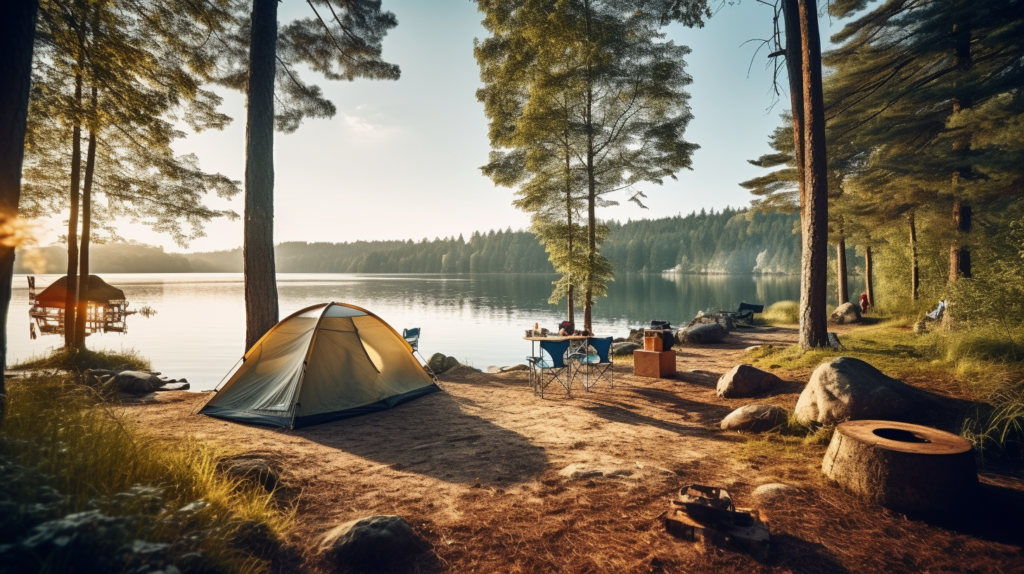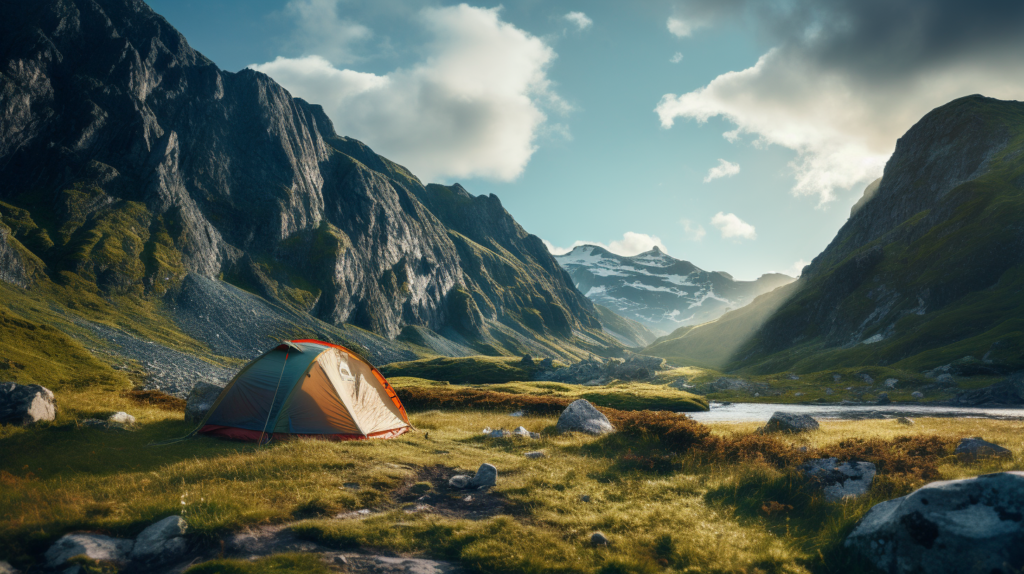Introduction
Lets take a look into camping on a budget, where we’ll explore some affordable adventures in nature. Picture this: breathing in the crisp morning air, surrounded by towering trees, serenaded by birdsong—the great outdoors beckons us with open arms. All while making sure that your campfire doesn’t end up burning a whole in your pocket!

Camping on a Budget
Camping on a budget is all about embracing the beauty of nature while being mindful of your financial resources. It’s about immersing yourself in landscapes without breaking the bank or sacrificing your savings account. This form of camping is rooted in finding cost-effective solutions and making smart choices throughout your adventure.
Unlike extravagant glamping (read our guide here) or holiday resorts, camping on a budget encourages simplicity and resourcefulness. It’s about getting back to basics—stripping away unnecessary luxuries to focus on what truly matters: connecting with nature and creating unforgettable memories without straining your wallet.
Affordable Adventures in Nature
Affordable adventures in nature offer an escape from our fast-paced lives, allowing us to reconnect with ourselves and find peace Mother Nature. With economic uncertainties, like a possible recession, looming over many individuals today, opting for budget-friendly camping trips becomes not only desirable but also necessary. Taking part in outdoor activities not only fosters physical health but also promotes mental wellbeing.
Studies have shown that spending time in natural environments can reduce stress levels and boost overall happiness. By making these experiences accessible through affordable options, we can help make sure that everyone has an opportunity to reap these benefits.
Beyond personal enrichment, budget camping also fosters a deeper appreciation for the environment. When we experience the forests, mountains, and rivers firsthand, we become more aware of their vulnerability and take on the responsibility of preserving them for future generations to come.
Choosing the Right Camping Destination
Researching budget-friendly campgrounds and national parks
When planning a camping trip on a budget, it’s crucial to do your research and find campgrounds that won’t break the bank. Start by looking for state or national parks that offer affordable camping options. Many of these parks have designated campsites with reasonable fees, allowing you to enjoy the beauty of nature without draining your wallet. Many state and national parks also offer free campsites. No need to pull out that wallet!
Take advantage of online resources and camping forums where fellow adventurers share their experiences and recommend budget-friendly camping destinations. These platforms often provide valuable insights into lesser-known campgrounds that may offer lower fees or discounts for longer stays. The Dyrt Forums are a great place to get started.
Off-season camping for better deals
One cost-saving strategy for budget campers is to consider off-season camping. During peak times, popular campgrounds tend to be pricier due to high demand. And with this, comes more crowded campgrounds. Sharing the camping experience with fellow outdoor-lovers can be great, but a quiet and peaceful camping trip may be more favorable to some.
During the shoulder seasons or winter months, prices drop significantly, offering a more affordable experience while still enjoying our natural surroundings. Off-season camping also brings other advantages beyond cost-saving.
You’ll likely encounter fewer crowds, allowing for a more peaceful and intimate outdoor experience. The tranquility of nature during these quieter periods can be truly rejuvenating as well.
Lesser-known, hidden gems
While it’s tempting to visit renowned national parks and well-established campgrounds, don’t overlook the beauty hiding in lesser-known destinations. Explore smaller state parks or regional conservation areas that might not be as popular but still offer beautiful, lesser-known landscapes and unique experiences. These hidden gems often come with lower entrance fees or even free access, making them perfect for those on a tight budget.
By venturing off the beaten path, you’ll not only save money but also discover unspoiled wilderness that offers a sense of serenity away from touristy crowds. Remember to pack your curiosity along with your camping gear, and be open to discovering these hidden treasures that may surprise you with their natural beauty and affordability.
Prioritizing the basics
When it comes to camping on a budget, prioritizing the essentials is key. The first items you should invest in are a good-quality tent, comfortable sleeping bags, and a reliable camp stove. Your tent will be your home away from home in the wilderness, so it’s important to choose one that suits your needs.
Look for affordable options that are lightweight yet durable, and consider the size based on how many people will be sharing it. Next up are sleeping bags. Don’t skimp on comfort! Get well-insulated sleeping bags that can handle different weather conditions. Look for ones with temperature ratings suited to the climate you’ll be camping in. Remember that a good night’s sleep is crucial for enjoying your adventure.
A camp stove is essential for preparing meals during your trip. Look for compact stoves that are easy to transport and operate. Choose one that uses affordable fuel sources like propane or butane canisters. Prioritize functionality over fancy features or brand names – remember, you’re camping on a budget and a source of heat is all you really need!
Borrowing or renting gear instead of buying new
One great way to save money when gearing up for your camping adventure is by borrowing or renting equipment instead of buying everything new. Reach out to friends or family members who may have camping gear they’re willing to lend you.
Borrowing gear not only saves you money but also allows you to try out different types of equipment before making any purchases yourself. If borrowing isn’t an option, consider renting gear from outdoor stores or specialized rental companies.
Many of these establishments offer affordable daily or weekly rates on items like tents, sleeping bags, backpacks, and even cooking utensils and stoves. This way, you’ll have access to high-quality gear without breaking the bank. Search around the web for local camping stores that may offer short-term rentals.
discounted outdoor equipment stores
When you’re on a budget, it’s important to be resourceful and find the best deals. Scout for discounted outdoor equipment stores both online and in your local area. These stores often offer discounts on camping gear, ranging from tents and sleeping bags to cooking utensils and hiking boots.
Keep an eye out for seasonal sales, clearance events, or even second-hand shops where you can find gently used camping gear at a fraction of the original cost. Joining online forums or groups dedicated to outdoor activities can also be a valuable resource for finding affordable gear options.
Remember, while it’s important to save money, ensure that you don’t compromise on quality when buying discounted gear. Seek reputable brands or read reviews from other campers to make informed decisions about your purchases. Brands like REI and Backcountry Gear run deals and clearance events year-round.
Saving Money on Food and Cooking Supplies
Meal planning and prep before the trip
When embarking on a budget camping excursion, proper meal planning and prepping can be your secret weapon to saving money. Take some time to brainstorm meals that are not only delicious but also easy on the wallet. Consider dishes that require minimal ingredients and can be cooked using basic equipment.
With a little creativity, you can whip up easy meals that won’t leave your wallet hurting. Start by making a detailed grocery list based on your planned menu.
Look for sales, discounts, or coupons at local supermarkets to score some great deals. Make use of your pantry staples like rice, pasta, beans, and canned goods which are affordable and versatile. Maybe that can of black beans in the back of your pantry has a use after all!
Look for fresh fruits and vegetables that have a longer shelf life such as apples, carrots, and potatoes and other foods that do not require refrigeration. Don’t forget to pack spices and condiments in small reusable containers to add flavor without breaking the bank. Nobody likes a bland meal.
Lightweight, non-perishable foods to reduce costs
One of the best ways to save money while camping is by choosing lightweight non-perishable foods that won’t spoil quickly. These items not only help cut down on food waste but also eliminate the need for refrigeration or coolers during your trip. Stock up on trail mix, energy bars, dried fruits, nuts, jerky – these snacks provide essential nutrients while being cost-effective.
For main meals, like breakfast, lunch, and dinner, invest in dehydrated or freeze-dried camping meals available in stores or online. These lightweight packets often come in different flavors like pasta dishes or soups; all you need is hot water to rehydrate them into quick meals at a fraction of the cost of eating out.
Campfire cooking techniques to minimize need for extra supplies
Cooking over a campfire not only adds a delightful rustic charm to your camping experience but can also save you money on cooking supplies. Instead of relying on just portable stoves or grills, try mastering the art of campfire cooking. With a sturdy grate or tripod, you can easily cook full meals over an open flame without the need for extra pots and pans.
Use foil packets by wrapping a combination of veggies, proteins, and seasonings in aluminum foil and placing them directly on hot coals. This method allows for easy cleanup and enhances flavors as the ingredients cook together.
Don’t forget to pack some skewers for roasting hot dogs or marshmallows – it’s a fun and inexpensive way to satisfy cravings. By planning your meals in advance, choosing lightweight non-perishable foods, and utilizing campfire cooking techniques, you can minimize food costs while still enjoying real meals in nature without breaking the bank.
Transportation Tips for Budget Campers
Carpooling with Friends or Joining Group Camping Trips
The joy of camping is often enhanced when shared with friends and loved ones. Not only does carpooling with your buddies make the journey more enjoyable, but it also helps reduce transportation costs.
By pooling resources and sharing the expenses, you can split the gas bill and minimize the impact on everyone’s wallets. To make carpooling even more enticing, consider organizing a group camping trip.
Gather a bunch of adventurous souls who share your love for nature and plan an epic outdoor adventure together. This not only lightens the financial burden but also allows you to bond with like-minded individuals who appreciate the beauty of the great outdoors.
Take Advantage of Public Transportation Options Near Camping Sites
For those without access to a personal vehicle or looking for eco-friendly alternatives, public transportation can be a lifesaver when embarking on budget camping trips. Many campgrounds are conveniently located near public transport options such as buses or trains.
Research your desired camping site beforehand to identify nearby public transportation routes and schedules. Public transportation can offer not only affordability but also an opportunity for unique experiences. Google Maps offers public transportation information, allowing for an easier planning stage when considering public transportation methods
Imagine hopping on a train through wide landscapes or taking a bus that rides along breathtaking coastal roads before reaching your campsite destination. Embrace this cheaper mode of travel and let it add an extra layer of excitement to your camping adventure.
Renting an RV or Camper Van as a Cost-Effective Alternative
If you’re looking for both convenience and affordability, renting an RV or camper van might be just what you need. While purchasing these vehicles outright may strain your budget, renting one for your camping trip opens up new possibilities without breaking the bank.
RVs and camper vans offer practical advantages such as built-in sleeping quarters, kitchen facilities, and bathrooms, allowing you to save money on accommodation and dining out. Not only that, but these vehicles also provide the freedom to explore multiple camping spots without the hassle of setting up and taking down a tent every time.
Before choosing an RV or camper van rental, compare prices from different companies and read reviews to ensure you get the best deal available. Take into consideration factors like rental duration, mileage limits, and additional fees for amenities. Also, treat these vehicles with respect so the next camper can enjoy them just as you do!
Free Activities in Nature
Thankfully, there are plenty of free activities in nature that can add depth and enjoyment to your camping experience. Let’s explore some of these activities and how you can maximize your time without spending a dime.
Hiking trails and nature walks without entrance fees
One of the best ways to immerse yourself in nature is by hitting the trails. Many national parks and even local parks offer hiking trails that do not require an entrance fee.
Take advantage of these opportunities to explore landscapes, forests, or vistas. Look for well-marked trails with varying difficulty levels so that you can choose one suited to your abilities and interests.
Before setting off on your hike, prepare by packing enough water, snacks, and appropriate footwear. Keep in mind that some parks might have restrictions or guidelines for pets or trail usage, so familiarize yourself with any rules beforehand to avoid surprises during your adventure.

Wildlife spotting and birdwatching as free entertainment
Nature is teeming with life if we take the time to observe it closely. Engaging in wildlife spotting is a fascinating activity that allows you to witness animals in their natural habitats. Whether it’s spotting deer at dawn or catching glimpses of colorful birds flying through the trees, this activity brings an enchanting time to your camping experience.
Remember to keep a safe distance from wild animals and respect their space. Bring along binoculars or a camera with a zoom lens for better sightings while preserving their safety as well as yours.
Stargazing and night photography without any additional cost
When the sun sets and darkness blankets the campground, a whole new world opens up above. Take advantage of the lack of light pollution in remote camping spots to indulge in some stargazing.
Lie back on a blanket or set up a comfortable chair, and allow yourself to be mesmerized by the celestial show above. If you have photography skills, night photography can be an exhilarating hobby to explore during your camping trip.
Capture stunning shots of the moon, stars, and even attempt long-exposure shots to capture trails of light. Experiment with different settings and techniques to capture the magic of the night sky.
Many modern smartphone cameras have long-exposure features, allowing you to see the nighttime as clear as day.
Creative Accommodation Options for Budget Campers
| Option | Description |
|---|---|
| A. Hammock Camping | Affordable, unique, and comfortable camping option. Lightweight and compact. Easy to set up. Ideal for backpackers or those with limited space. Versatile placement with suitable anchor points. Lower cost compared to traditional camping gear. Proper insulation and accessories available. |
| B. Primitive Campsites or Dispersed Camping | – Primitive Campsites: Affordable or free. Lack amenities but offer beautiful natural surroundings. Basic facilities like pit toilets and fire rings may be available. – Dispersed Camping: Set up tents virtually anywhere within designated areas. Check local regulations. Enjoy nature with fewer crowds. Save money on campsite fees. |
| C. Volunteer Opportunities at Campsites | Contribute time and skills in exchange for free or discounted stays. Work exchange programs available. Tasks include maintaining trails, cleaning facilities, or providing visitor information. Connect with fellow nature enthusiasts. Learn about the local environment. Foster a sense of community. |
Safety Considerations for Budget Camping
Investing in Quality
When going on a budget camping adventure, it’s crucial not to compromise on safety. While you may be tempted to save money by buying cheaper camping gear, remember that your well-being is at stake. Invest in quality equipment that will withstand the elements and provide the necessary protection.
A sturdy tent with a waterproof rainfly will keep you dry during unexpected showers, while a reliable sleeping bag rated for the appropriate temperature will ensure a safe and comfortable night’s sleep. Investing in durable hiking boots and proper outdoor attire will prevent injuries and discomfort during your hikes.
Planning for Emergencies
While nobody wants to dwell on negative scenarios, it’s essential to be prepared for emergencies when camping. Ensure that you have a well-stocked first aid kit that includes bandages, antiseptic ointment, pain relievers, and any necessary prescription medication.
Familiarize yourself with basic first aid procedures before your trip as well. It’s also wise to carry a map and compass or GPS device to avoid getting lost in unfamiliar terrain. It can only take a split second to get lost.
Staying Safe in the Wilderness
When venturing into the great outdoors, it’s important to respect nature and its potential dangers. Be aware of any wildlife risks specific to your camping destination and take precautions accordingly—such as storing food securely to avoid attracting animals. Always follow campfire safety guidelines and check if fire restrictions are in place during dry seasons.
Inform someone about your itinerary before leaving for your trip so that they can alert authorities if needed.
Conclusion:
As you embark on your budget camping adventures, remember that safety should never be compromised. By investing in quality equipment, planning for emergencies, and staying informed about wilderness safety measures, you can fully enjoy the wonders of nature without unnecessary risks.
So embrace the joy of affordable adventures in nature, knowing that with careful preparation and a dash of common sense, you’ll create cherished memories while staying safe and sound. Happy camping!
